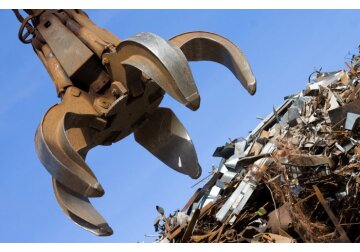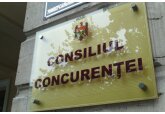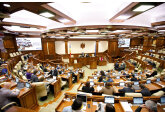
The European Union lifted the ban on the supply of scrap metal to Moldova
The corresponding decision was made by the European Commission, amending the Regulation on the export of certain waste for processing and lifting restrictions on the export of scrap metal to Moldova. Earlier, the Ministry of the Environment stated that the Moldovan authorities are seeking to lift the erroneously imposed ban on imports to Moldova of ferrous scrap and other waste from the European Union. As explained by the relevant authority, in accordance with the EU legislation on the export of certain wastes for processing, the list of wastes and the countries to which they can be exported are subject to periodic assessment and change. The decision of the European Union to include or exclude certain wastes is also based on the national legislation of countries regarding the import and processing regime. In the spring of 2019, the European Commission commissioned a study to correct the list. At that time, Moldova provided the relevant information requested by the experts, but in the process of compiling the list by international experts, an error was made, and the provisions of Law 209/2016 on waste, which allow exceptions from the import to Moldova of certain categories of waste, were not included as an exception in the Annexes III and IIIA to the European Commission Regulation. The Waste Law stipulates that the import of waste and residues of any kind into Moldova is prohibited, with the exception of the categories of waste presented in Annex No. 7, which, in turn, provides a list of exceptions, including glass, cardboard and used metal. As noted, at that time information for updating Regulation (EC) No 1418/2007 was submitted by more than 80 states, and technical errors were made, in particular, in the case of India, Belarus and Moldova. The Decree came into force in November 2021, when the export from the EU of certain categories of waste, including scrap metal, to countries with which there were previously trade relations in this segment was suspended. Due to error reports from several countries, the European Commission asked them to send an official letter in order to initiate the procedure for correcting Annexes III and III A to Regulation of the European Union No. 1013/2006. In order to ensure consistency between the laws of Moldova and the EU, the proper functioning of national legislation and making adjustments together with other states, the Ministry of the Environment sent a letter to the European Commission to amend the relevant annexes. They drew attention to the fact that the Regulation of the European Commission expressly provides that the processing of waste exported from the EU to Moldova is carried out only by companies that have an environmental permit. This permit is issued only by the Environmental Protection Agency of Moldova. Accordingly, companies that do not comply with the environmental regulatory framework will not be able to import and process certain categories of waste, even if the amendments to Regulation 1418/2007 are approved by the European Commission and the export of ferrous scrap to Moldova is allowed. Prime Minister Natalia Gavrilita said earlier that the Cabinet of Ministers is seeking to remove Moldova from the "black list" of countries that cannot be supplied with scrap metal from the EU, while maintaining Chisinau's ability to control this import. At the same time, she called "a lie" the accusations of lobbying by the Moldovan government for the interests of the Moldovan Metallurgical Plant located in the Transnistrian region from the city of Ribnita. She noted that the Moldovan authorities, in particular, representatives of the Ministry of the Environment, appealed to the European Commission on this issue, but the letter concerns only the application of national legislation to the import of scrap metal. "Export from the European Union to Moldova is one thing. And import to Moldova is already a policy that is directly controlled by Moldova. At the moment, there is no import. And the circulation must go through the necessary internal procedures in the European Union. But we believe that the levers of influence are here , and we must not allow Moldova to be on the "black list" of the EU due to some discrepancies that can be corrected by the government inside the country, by domestic politicians," said Natalia Gavrilita. She noted that many countries are fighting for the opportunity to import metal from the EU countries, and Moldova should not lose this opportunity, especially since one large company intends to work in this area on the right bank of the Dniester. // 04.04.2022 — InfoMarket







